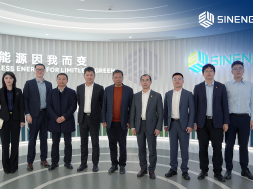
IFC-led consortium to invest $653M in world’s largest solar park in Egypt
CAIRO – : The International Finance Corporation (IFC), a member of the World Bank Group, finalized a landmark $653 million debt package to finance the construction of 13 solar power plants near the Egyptian governorate of Aswan, according to a press statement issued Sunday.
The IFC’s move reflects confidence in Egypt’s economy and government’s commitment to the reform program. The facilities will join 19 other solar plants in making up the Benban Solar Park, which will be the largest solar power installation in the world upon completion.
During construction, the projects will create 6,000 jobs and over 350,000 residential customers are expected to benefit from the cost-effective and eco-friendly power that will be generated.
The plants, which will generate up to 752 megawatts of solar power to supply Egypt with clean and renewable energy, are estimated to cost a total of $823 million to build; of which $653 million will be covered by the financing package provided by IFC and a consortium of nine international banks. IFC alone is providing $202 million in financing.
The consortium includes the Africa Development Bank, the Asian Infrastructure Investment Bank; the Arab Bank of Bahrain, CDC of the United Kingdom, Europe Arab Bank, Finance in Motion, FinnFund, ICBC, and OeEB of Austria.
Together with the IFC, their financing will support six groups of private power companies, which together will build and operate the 13 plants.
In September 2014, Egypt announced its Feed-in-Tariff program to leverage private sector capital and expertise to support the country’s goal of generating 20 percent of its electricity from renewable resources by 2022.
The Benban Solar Park, which will include 32 power plants in all, is an important part of the initiative.
“Egypt’s reforms in its energy sector opened the door to private sector investments,” said Philippe Le Houérou, the CEO of IFC.
“For the Benban Solar Park project, those reforms and our innovative financial tools have helped attract a number of investors and financiers into the country for the first time. This will create jobs for many Egyptians and provide clean and reliable energy for people across the country,” he added.
Minister of International Cooperation and Investment, Sahar Nasr, Egypt’s governor for the WBG said that the IFC’s approval to establish this project reflects the confidence of the international financial institutions and major world economies in the Egyptian economy, predicting prospects of growth in the upcoming period.
“Egypt has taken unprecedented measures in its program of economic reforms, including structural reforms in the energy sector, besides creating new legislative structure to attract foreign investment,” Nasr said, adding that the project follows Egypt’s commitment to the resolutions of the Paris Climate Agreement.
The IFC funding is part of an inclusive project to produce solar energy in Egypt, where the European Bank for Reconstruction and Development and many major worldwide corporations have investments worth $ 2 billion.
Egypt’s decision to launch the FiT scheme was part of a series of economic reforms, backed by the World Bank, to improve essential services and competitiveness, while curbing deficit.
The Multilateral Investment Guarantee Agency, another member of the World Bank Group, has obtained approval to provide $210 million in political risk insurance to 12 projects within Benban.
“IFC’s investment in the solar park is part of a global strategy to increase investments in renewable energy, helping countries reduce their reliance on fossil fuels. IFC has been a pioneer in renewable energy investments in several markets around the world, especially in early years when private sector financing for renewable energy was considered risky,” the IFC said in a statement.
“IFC’s renewable investments share of its power portfolio has more than doubled in the last decade to 60 percent,” it added.
Egypt opted for 30-plus smaller solar plants at 50 megawatts instead of one large project of 1,600 megawatts, with the aim of maximizing the number of participants and investors, as a large number of lenders and investors familiar with the country would facilitate future rounds of infrastructure investment.














